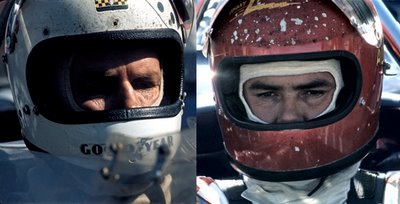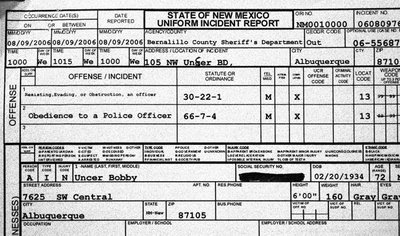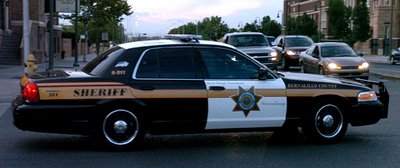 Who are these masked men?
Who are these masked men?They are Albuquerque’s own famous Indianapolis 500 champions, the Unser brothers, Bobby Sr. and Al Sr.
So why are they shown in masks?
According to Bernalillo County deputy sheriffs, they are scofflaws.
On Aug. 9, 2006, Albuquerque police chased a stolen vehicle that stopped at Unser Boulevard and Bluewater, north of Central Avenue. The driver had fired shots at pursuing officers and when he stopped, he refused to give up his gun or come out of the car. A standoff ensued, and the police special weapons and tactics team was called.
Deputy sheriffs assisted by manning a roadblock at Unser and Central, blocking traffic from going north.
Eventually the man shot himself, in what officials described as an apparent suicide.
According to two separate official incident reports filed by Bernalillo County sheriffs’ deputies, with the Albuquerque police department’s records division, Al Unser drove onto property owned by the family on the northeast corner of the intersection at 9:50 a.m. Deputy sheriffs, thinking he was avoiding their roadblock, intercepted him and ordered him off his own property. Ten minutes later, brother Bobby happened upon the same scene.
In press statements made after their release from jail, they gave almost identical statements. Of great import was that, according to the Unser brothers, the Sheriff’s deputies used two unmarked vehicles to block the intersection. Other marked units were off to the side. Independently, the brothers believed they had come upon an accident involving the unmarked vehicles and it was being investigated by the other officers. Neither recognized that it was a roadblock.
In both cases, the Unsers drove past the perceived accident onto their family-owned property. Al Unser was stopped when three deputies yelled at him.
Deputy S. Covington’s report states that two deputies told Unser to leave without explanation, which started a discussion. Covington wrote: “The driver began to argue with Sgt. J. (Jason) Katz. I told the male driver that we were in the process of investigating a shooting and that he was obstructing. I ordered him to leave immediately. The driver verbally challenged deputies by informing me that I did not have the authority to make him leave private property….”
At some point Al Unser turned around and was headed off his property when Katz indicated: “…but did not leave. Instead he rolled down his passenger window and yelled something towards deputies.” The incident flared and instead of defusing, the deputies reengaged and ultimately arrested Al Unser.
Moments later, Bobby Unser rolled into the same scenario with similar results.
So what's wrong with this picture?
 This is the front page of the Bobby Unser arrest report written by Deputy Jason Hatch.
This is the front page of the Bobby Unser arrest report written by Deputy Jason Hatch. He misspelled Unser as "Uncer."
This error is indicative of this entire incident; close, but wrong.
I don’t normally publicly dissect the actions of law enforcement during a pending case. However, this case screams out for a sharp knife and deep cuts.
Over 170 years ago, Sir Robert (Bobby) Peel created the first governmental police department in London, England. He established some fundamental principles for policing that have withstood the test of time.
Three of his rules are more than applicable here:
* The police must be stable, efficient and militarily organized under governmental control.
* No quality is more indispensable to an officer than a perfect command of his temper; a quiet determined action has more effect than violent action.
* Proper securing and training of personnel lies at the root of police efficiency.
 Let’s take a closer look….
Let’s take a closer look….“The police must be stable, efficient and militarily organized under governmental control.”
There is a reason why supervisors should be called to scenes when there are problems. They are to bring calm and restore order, if things have gotten a bit out of hand.
In this case, Sgt. Katz was the problem. He did not let his charges do their jobs. He stepped in immediately and acted as nothing more than a street deputy. He did not supervise. Citizens do not distinguish rank. Rank is an internal structural component of control. By stepping into the fray, the structure of control is obliterated.
 “No quality is more indispensable to an officer than a perfect command of his temper; a quiet determined action has more effect than violent action.”
“No quality is more indispensable to an officer than a perfect command of his temper; a quiet determined action has more effect than violent action.”Deputies never gained control, in part because they misused the English language. They used police jargon that only further aggravated the situations.
There were multiple officers engaging both brothers. This does not help. It is perceived as “ganging up,” intimidation and “bullying.”
Sgt. Katz wrote of Al Unser, “He was eventually taken into custody for his own safety due to the current police emergency that was occurring at the time of Unser’s arrest.” Of Bobby Unser, Katz wrote, “He was taken into custody for his own safety due to the current police emergency that was occurring at the time of Unser’s arrest.”
Instead of holding the Unsers in the backseat of a hot patrol unit until tempers settled and a calm rapprochement could take place, they were transported and booked.
 “Proper securing and training of personnel lies at the root of police efficiency.”
“Proper securing and training of personnel lies at the root of police efficiency.”Deputies recognized where they were, on Unsers’ property, but clearly failed to understand the significance of this.
In the deputies’ reports, the emphasis on the number of times they ordered the brothers to leave without success was documented. What is missing is the realization that barking commands was not working and that there needed to be a movement from the emotional state that all the participants were in. The responsibility to move this state belongs solely upon law enforcement. There are techniques to allow irate citizens to vent and defuse their emotions and then to maneuver them to into a mode that allows for a rational discussion.
These are simple costumer service concepts taught at various academies, though maybe not at the Bernalillo County Sheriffs Department, as their practice on this particular day suggests.
May officials force the evacuation of people from their own property in what is perceived as a dangerous situation?
If the person wanders into the scene to the point that it interferes with the operation or obstructs officers from doing their jobs, then his or her removal may be called for.
Once a person is made aware of the risks, how he or she deal with it is up to them.
People have property rights and they have the right to make bad decisions, even dangerous and irresponsible ones.
The idea of mandatory evacuation is a myth that officers sometimes take seriously. For example, a number of people were killed in the flooding of New Orleans last year in the aftermath of hurricane Katrina when the levees burst in spite of evacuation orders.
There is a long-standing debate about how far an officer can go to keep a person from being in the midst of a dangerous situation. Quite often this debate plays itself out over how the news media cover police actions. Ironically, in this case an Eyewitness News 4 KOB television camera was recording the arrest of Bobby Unser and aired videotape of him being placed in a patrol car.
This may indicate a lack of and failure to properly train issues by the official’s actions demonstrated that day.
 Lets look at the charges:
Lets look at the charges:Both brothers were charged with the same offenses, according to the Bernalillo County Metropolitan Court Web site: resisting, evading or obstructing an officer, a criminal misdemeanor and obedience to police officers, a traffic offense. Both are violations of state statutes.
30-22-1 Resisting, evading or obstructing an officer.
Resisting, evading or obstructing an officer consists of:
A. knowingly obstructing, resisting or opposing any officer of this state or any other duly authorized person serving or attempting to serve or execute any process or any rule or order of any of the courts of this state or any other judicial writ or process;
B. intentionally fleeing, attempting to evade or evading an officer of this state when the person committing the act of fleeing, attempting to evade or evasion has knowledge that the officer is attempting to apprehend or arrest him;
C. willfully refusing to bring a vehicle to a stop when given a visual or audible signal to stop, whether by hand, voice, emergency light, flashing light, siren or other signal, by a uniformed officer in an appropriately marked police vehicle; or
D. resisting or abusing any judge, magistrate or peace officer in the lawful discharge of his duties.
Whoever commits resisting, evading or obstructing an officer is guilty of a misdemeanor.
 So what are we dealing with?
So what are we dealing with? Section A does not apply because the officers were not serving or executing any process or order of a court.
Section B does not apply because the Unsers did not know they were fleeing the officers and stopped when told to do so. Further the officers were not attempting to apprehend or arrest them. They were trying to keep them from going into a dangerous situation.
Section C does not apply because the officers successfully stopped them while on foot. Further, the vehicles that the Unsers passed were unmarked and not "appropriately marked police vehicles."

Section D does not apply because the officers were not abused. There is an old axiom that a police officers peace my never be disturbed. It has a couple of meanings; that an officer may not be flustered and that what might be a disruption of the peace if other citizens were present, does not apply to the officer, in part because it would require the officer’s emotions to be stimulated and that immediately removes his impartiality.
As to the obedience to police officers charge:
No person shall willfully fail or refuse to comply with any lawful order or direction of any police officer invested by law with authority to direct, control or regulate traffic.
This charge is the traffic code’s twin of the criminal charge above.
Both brothers stopped. The question of whether the officer had lawful authority to direct them from their own property is more than suspect. Further, once on their property they no longer constitute traffic.
 Is there a lawful charge?
Is there a lawful charge?No!
What we are dealing with is the substrata of the police world.
There are a number of charges that don’t exist on the books but live in the hearts of law enforcers under the heading of Contempt of Cop. They include: Mopery with the intent to creep; PO the PO or Pissing Off the Police Officer and Failure to do right in a do right zone.
If it weren’t so serious it could be funny.
One last thought…

Sheriff Darren White is a pugnacious sort whose attitude was set through the rule of primacy. In other words, what he learned first he believes. According to his department’s Web site biography he, “…served in the U.S. Army as a member of the elite 82nd Airborne Division.” The unofficial motto of the 82nd is "Kill 'em all and let God sort 'em out!" White cannot distance himself from this morally reprehensible philosophy and therefore leads his department into these traps that allow them to be perceived as inept, bombastic and bullies; ultimately distrusted.
The majority of deputies, act appropriately in regard to their station, the majority of the time.
Sheriff White needs to take control of this matter and put an end to it before it continues deeper into the mud.
 District Attorney Kari Brandenburgh also needs to recognize the fallacy and folly of this case and quietly drop it.
District Attorney Kari Brandenburgh also needs to recognize the fallacy and folly of this case and quietly drop it.
No comments:
Post a Comment